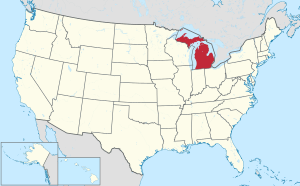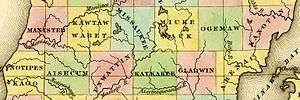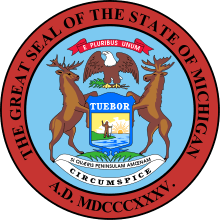Osceola County, Michigan
Osceola County is a county located in the U.S. state of Michigan. At the 2010 census, the population was 23,528.[2] The county seat is Reed City.[3]
Osceola County | |
|---|---|
.jpg) Osceola County Courthouse | |
Seal | |
 Location within the U.S. state of Michigan | |
 Michigan's location within the U.S. | |
| Coordinates: 43°59′N 85°20′W | |
| Country | |
| State | |
| Founded | April 1, 1840 (created) 1869 (organized)[1] |
| Named for | Osceola |
| Seat | Reed City |
| Largest city | Reed City |
| Area | |
| • Total | 573 sq mi (1,480 km2) |
| • Land | 566 sq mi (1,470 km2) |
| • Water | 6.7 sq mi (17 km2) 1.2%% |
| Population | |
| • Estimate (2018) | 23,341 |
| • Density | 42/sq mi (16/km2) |
| Time zone | UTC−5 (Eastern) |
| • Summer (DST) | UTC−4 (EDT) |
| Congressional district | 4th |
| Website | www |
History

When established by the Michigan Legislature on April 1, 1840, it was named Unwattin County,[4] after Chief Unwattin of the local Ottawa people.[5] As one of the representatives of the Ottawa nation, he participated in negotiations for the Treaty of Washington (1836) that granted a vast expanse of Michigan to the U.S. Federal Government.[4] The name was changed March 8, 1843, to Osceola, after the Seminole chief who achieved renown in Florida.[1]
The county was initially attached for administrative purposes to Ottawa County. In 1855, it was attached to Mason County; in 1857, to Newaygo County; and in 1859, to Mecosta County.[4]
As the population increased, separate county government was organized in 1869, with Hersey designated as the county seat. Reed City became the official county seat in 1927.[1] The county was developed initially for harvesting and processing lumber, and many European Americans came to work in lumbering and the mills.
Geography
According to the U.S. Census Bureau, the county has a total area of 573 square miles (1,480 km2), of which 566 square miles (1,470 km2) is land and 6.7 square miles (17 km2) (6.7%) is water.[6] The county is drained by Muskegon River and branches of the Manistee River. The surface is level.[7] Osceola County is part of Northern Michigan.
Adjacent counties
- Missaukee County (northeast)
- Wexford County (northwest)
- Clare County (east)
- Lake County (west)
- Mecosta County (south)
Demographics
| Historical population | |||
|---|---|---|---|
| Census | Pop. | %± | |
| 1860 | 27 | — | |
| 1870 | 2,093 | 7,651.9% | |
| 1880 | 10,777 | 414.9% | |
| 1890 | 14,630 | 35.8% | |
| 1900 | 17,859 | 22.1% | |
| 1910 | 17,889 | 0.2% | |
| 1920 | 15,221 | −14.9% | |
| 1930 | 12,806 | −15.9% | |
| 1940 | 13,309 | 3.9% | |
| 1950 | 13,797 | 3.7% | |
| 1960 | 13,595 | −1.5% | |
| 1970 | 14,838 | 9.1% | |
| 1980 | 18,928 | 27.6% | |
| 1990 | 20,146 | 6.4% | |
| 2000 | 23,197 | 15.1% | |
| 2010 | 23,528 | 1.4% | |
| Est. 2018 | 23,341 | [8] | −0.8% |
| U.S. Decennial Census[9] 1790-1960[10] 1900-1990[11] 1990-2000[12] 2010-2018[2] | |||
At the 2000 census,[13] there were 23,197 people, 8,861 households and 6,415 families residing in the county. The population density was 41 per square mile (16/km²). There were 12,853 housing units at an average density of 23 per square mile (9/km²). The racial makeup of the county was 97.51% White, 0.35% Black or African American, 0.50% Native American, 0.22% Asian, 0.02% Pacific Islander, 0.20% from other races, and 1.21% from two or more races. 0.99% of the population were Hispanic or Latino of any race. 26.0% were of German, 11.9% English, 11.0% American, 8.8% Irish, 6.5% Dutch and 5.2% Polish ancestry. 96.8% spoke English, 1.1% German and 1.0% Spanish as their first language.
There were 8,861 households of which 32.90% had children under the age of 18 living with them, 58.10% were married couples living together, 9.70% had a female householder with no husband present, and 27.60% were non-families. 22.60% of all households were made up of individuals and 9.80% had someone living alone who was 65 years of age or older. The average household size was 2.58 and the average family size was 3.01.
27.10% of the population were under the age of 18, 8.00% from 18 to 24, 26.50% from 25 to 44, 24.20% from 45 to 64, and 14.20% who were 65 years of age or older. The median age was 38 years. For every 100 females there were 97.70 males. For every 100 females age 18 and over, there were 94.70 males.
The median household income was $34,102 and the median family income was $39,205. Males had a median income of $29,837 compared with $22,278 for females. The per capita income for the county was $15,632. About 9.50% of families and 12.70% of the population were below the poverty line, including 15.90% of those under age 18 and 10.30% of those age 65 or over.
Government
| Year | Republican | Democratic | Third Parties |
|---|---|---|---|
| 2016 | 69.2% 7,336 | 25.5% 2,705 | 5.4% 568 |
| 2012 | 59.8% 6,141 | 38.7% 3,981 | 1.5% 156 |
| 2008 | 54.2% 5,973 | 44.0% 4,855 | 1.8% 198 |
| 2004 | 59.0% 6,599 | 39.9% 4,467 | 1.1% 122 |
| 2000 | 57.2% 5,680 | 40.3% 4,006 | 2.5% 244 |
| 1996 | 42.4% 3,855 | 44.9% 4,085 | 12.7% 1,150 |
| 1992 | 38.5% 3,606 | 37.6% 3,529 | 23.9% 2,241 |
| 1988 | 64.3% 5,218 | 35.2% 2,860 | 0.5% 43 |
| 1984 | 73.2% 5,923 | 26.3% 2,127 | 0.5% 40 |
| 1980 | 60.0% 4,902 | 32.5% 2,650 | 7.5% 612 |
| 1976 | 62.2% 4,467 | 36.3% 2,603 | 1.5% 108 |
| 1972 | 70.0% 4,441 | 26.9% 1,706 | 3.2% 202 |
| 1968 | 63.8% 3,705 | 26.0% 1,509 | 10.3% 596 |
| 1964 | 48.8% 2,779 | 50.8% 2,891 | 0.4% 20 |
| 1960 | 76.3% 4,477 | 23.5% 1,378 | 0.2% 10 |
| 1956 | 78.3% 4,549 | 21.3% 1,236 | 0.5% 26 |
| 1952 | 78.9% 4,607 | 19.9% 1,160 | 1.3% 75 |
| 1948 | 68.5% 3,122 | 28.0% 1,276 | 3.5% 157 |
| 1944 | 73.1% 3,787 | 25.8% 1,338 | 1.0% 53 |
| 1940 | 72.9% 4,217 | 26.9% 1,555 | 0.3% 17 |
| 1936 | 56.3% 3,107 | 36.1% 1,992 | 7.6% 421 |
| 1932 | 55.2% 2,969 | 43.1% 2,321 | 1.7% 91 |
| 1928 | 86.7% 3,923 | 12.9% 582 | 0.5% 22 |
| 1924 | 77.8% 3,050 | 14.4% 566 | 7.8% 305 |
| 1920 | 80.8% 3,603 | 17.3% 769 | 1.9% 85 |
| 1916 | 61.9% 2,193 | 36.3% 1,285 | 1.8% 65 |
| 1912 | 37.0% 1,306 | 17.3% 609 | 45.7% 1,612 |
| 1908 | 74.4% 2,718 | 21.0% 767 | 4.6% 169 |
| 1904 | 80.2% 2,936 | 15.4% 562 | 4.4% 161 |
| 1900 | 71.1% 2,635 | 23.7% 880 | 5.2% 192 |
| 1896 | 62.9% 2,268 | 32.6% 1,177 | 4.5% 161 |
| 1892 | 51.1% 1,601 | 34.9% 1,092 | 14.0% 438 |
| 1888 | 57.0% 1,882 | 33.0% 1,090 | 10.0% 329 |
| 1884 | 58.4% 1,497 | 30.9% 792 | 10.7% 273 |
The county government operates the jail, maintains rural roads, operates the major local courts, keeps files of deeds and mortgages, maintains vital records, administers public health regulations, and participates with the state in the provision of welfare and other social services. The county board of commissioners controls the budget but has only limited authority to make laws or ordinances. In Michigan, most local government functions — police and fire, building and zoning, tax assessment, street maintenance, etc. — are the responsibility of individual cities and townships.
Elected officials
- Prosecuting Attorney: Anthony Badovinac
- Sheriff: James A. Crawford
- County Clerk: Karen J . Bluhm
- County Treasurer: Lori Leudeman
- Register of Deeds: Nancy Crawford
- Drain Commissioner: Jerry Powell
- County Surveyor: Bill Sikkema
(information as of January 2009)
Communities
Unincorporated communities
- Park Lake
- Sears
See also
- List of Michigan State Historic Sites in Osceola County, Michigan
- National Register of Historic Places listings in Osceola County, Michigan
References
- "Bibliography on Osceola County". Clarke Historical Library, Central Michigan University. Retrieved January 29, 2013.
- "State & County QuickFacts". United States Census Bureau. Archived from the original on June 6, 2011. Retrieved August 29, 2013.
- "Find a County". National Association of Counties. Retrieved June 7, 2011.
- Newberry Library. "Michigan: Individual County Chronologies". Atlas of County Historical Boundaries. Retrieved November 4, 2016.
- "Michigan Historical Collections". The Commission. 6 October 2018 – via Google Books.
- "2010 Census Gazetteer Files". United States Census Bureau. August 22, 2012. Archived from the original on November 13, 2013. Retrieved September 27, 2014.
-

- "Population and Housing Unit Estimates". Retrieved May 17, 2019.
- "U.S. Decennial Census". United States Census Bureau. Retrieved September 27, 2014.
- "Historical Census Browser". University of Virginia Library. Retrieved September 27, 2014.
- "Population of Counties by Decennial Census: 1900 to 1990". United States Census Bureau. Retrieved September 27, 2014.
- "Census 2000 PHC-T-4. Ranking Tables for Counties: 1990 and 2000" (PDF). United States Census Bureau. Retrieved September 27, 2014.
- "U.S. Census website". United States Census Bureau. Retrieved January 31, 2008.
- Leip, David. "Dave Leip's Atlas of U.S. Presidential Elections". uselectionatlas.org.
External links
- Official website
- "Bibliography on Osceola County". Clarke Historical Library, Central Michigan University. Retrieved January 29, 2013.

